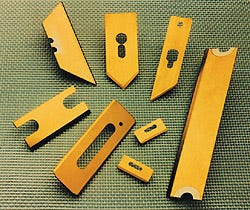Treatment Enhances Cutting Blades
October 1, 1998

Treatment Enhances Cutting Blades
Coating lengthens blade life for medical manufacturer.
Cutting rubber smoothly and consistently can sometimes be a troublesome project for medical device manufacturers. Abrasive additives in rubber compounds can erode the sharpness of a cutting blade, while rubber residue on a blade's surfaces can cause drag and friction. In short periods of time, rubber can dramatically wear down an edge's sharpness.
As a manufacturer of rubber strips for ECG electrodes, ConMed Corp. (Utica, NY) understands the problems that cutting blades can encounter with rubber. ConMed's small, one-time-use rubber strips are manufactured to hold the lead wires in place on a patient during an ECG test. These rubber strips are manufactured by slicing ribbons of rubber into 1- to 2-in.-long, clean, even pieces. As the company discovered, though, these rubber ribbons can wreak havoc on untreated cutting blades, forcing repeated blade changeovers to maintain a clean, effective cut. To correct the problem, the company turned to General Magnaplate Corp.'s (Linden, NJ) Goldenedge reactive ion deposition surface enhancement, which dramatically increased the durability and sharpness of its blades.
 The Goldenedge surface treatment helps cutting edges resist wear and abrasion while lengthening service life.
The Goldenedge surface treatment helps cutting edges resist wear and abrasion while lengthening service life.
In 1993, ConMed purchased Andover Medical Corp. and incorporated its product line into ConMed's new ECG manufacturing division. Using Andover's leftover supply of cutting blades, ConMed's productivity levels matched expectations and production went smoothly. But manufacturing problems arose when the old supply of blades ran low and ConMed ordered a new batch. The company found that these replacement blades wore out so quickly that it had to stop all production once or twice daily to replace them. Production costs jumped as wasted downtime began to add up with the frequent blade changeovers.
ConMed reported the problem to the blade manufacturer, but found that the new batch of blades was manufactured to the same specifications as earlier batches. Eager to find the problem, ConMed manufacturing engineer John Saltamach began looking through Andover's old records for hints at what might be going wrong. There, he discovered the source of the problem: previously, the blades had been sent to General Magnaplate Corp. to be treated with a coating enhancement.
This coating was General Magnaplate's Goldenedge surface treatment, an ultrahard, microthin, enhanced titanium nitride that can be applied to the cutting edges of blades, knives, slicers, and other sharp-edged devices. The coating resists wear and abrasion while lengthening service life by up to 20 times in some cases. And, unlike chemical vapor deposition processes that require temperatures as high as 1800°F (hot enough to produce excessive distortion and warping in the metal), Goldenedge's physical vapor deposition process employs temperatures as low as 400°F. As a result, this process can coat a variety of materials without causing a loss of hardness, affecting metallurgical properties, or distorting the substrate.
Goldenedge can be applied in controlled thickness levels to within ±0.000015 in., preventing dulling even on angles as small as 7°–9°. As General Magnaplate corporate vice president Walter Alina notes, "Normally with titanium nitride, you'd put 2 to 5 microns on a surface. But if you have a very razor-sharp edge and want to maintain that, you'd have to cut way back on the metal's thickness. So we just deposit a micron, maybe a little bit more, and that's it." Goldenedge also has an extremely fine grain structure that results in a low coefficient of friction. As Alina says, "This coating is about as uniform as you can get. Our proprietary system provides for deposition of a very fine molecule. We take a great deal of care to build up a very thin coat."
With Goldenedge once again applied to its cutting blades, ConMed found that its production line ran with its original level of efficiency. Now, instead of changing blades one to three times during an eight-hour shift, the enhanced blades last well into a second shift. Says ConMed's Saltamach, "There was a dramatic difference between the coated and the uncoated blades. The Goldenedge blades worked like a charm. And their extra life is an important factor in keeping our costs down."
You May Also Like

.png?width=300&auto=webp&quality=80&disable=upscale)
